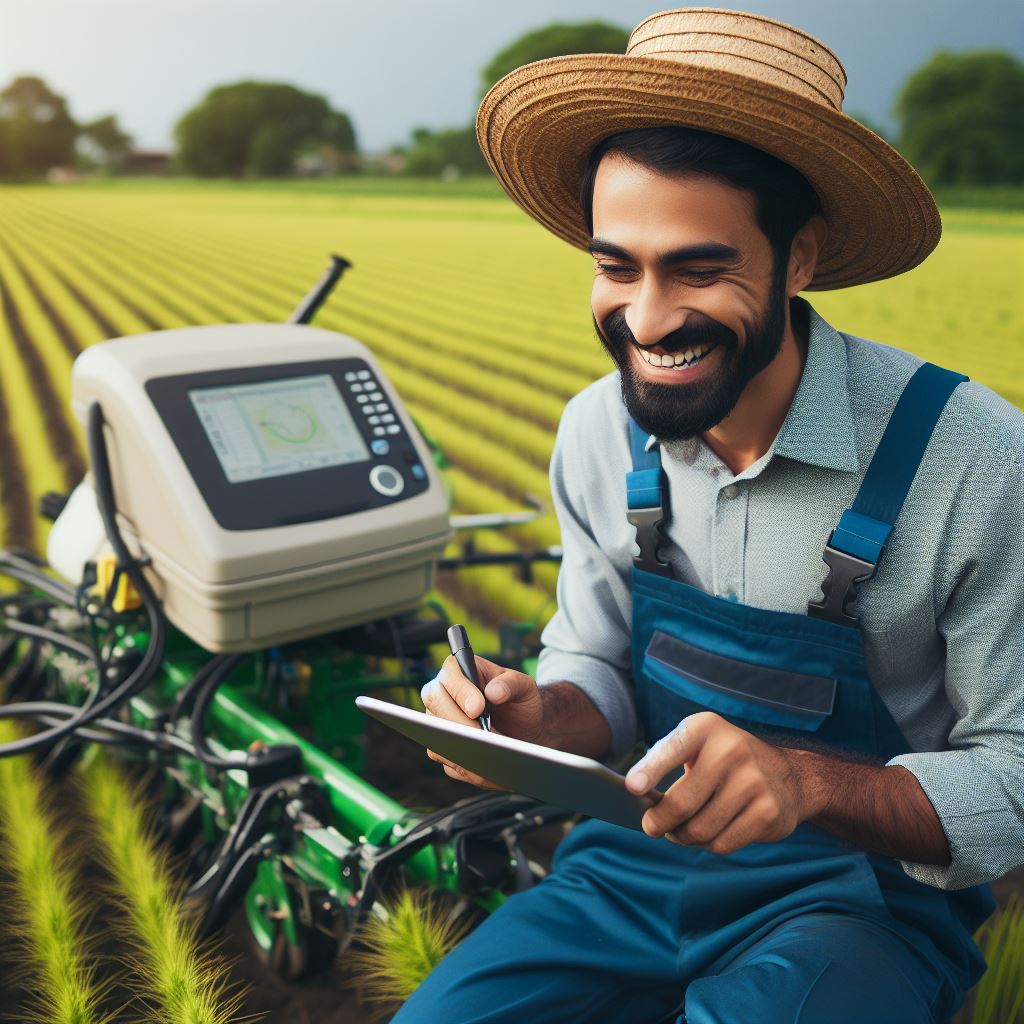Introduction
Generation Z, or Gen Z, encompasses individuals born between 1997 and 2012, making them the youngest generation alive today.
Despite their age, Gen Z already has a significant impact on various industries, including agriculture.
This blog post aims to provide a comprehensive overview of Gen Z farmers and their growing importance in revolutionizing agriculture.
A. Importance of Generation Z in agriculture
The Gen Z farmers of today bring fresh perspectives and innovative ideas to the agricultural sector.
Their youthfulness and exposure to advanced technology have equipped them with the ability to thrive amidst the ever-changing landscape of farming practices.
Furthermore, Gen Z farmers possess a deep sense of environmental consciousness and sustainable farming methods.
B. Purpose of the blog post
The key purpose of this blog post is to shed light on the valuable contributions of Gen Z in agriculture.
From embracing precision farming techniques to implementing cutting-edge technology such as drones and artificial intelligence, Gen Z farmers are finding innovative solutions to age-old challenges in the industry.
They are at the forefront of incorporating sustainable practices, enhancing efficiency, and ensuring food security.
With their digital fluency and passion for sustainable farming, Gen Z farmers are reshaping the future of agriculture.
This blog post will delve into the significant role Gen Z plays in cultivating a more sustainable and technologically advanced agricultural landscape.
By championing sustainable practices and embracing emerging technologies, Gen Z is leading the way towards a more prosperous and environmentally conscious agricultural sector.
Characteristics of Gen Z Farmers
A. Technologically savvy
Gen Z farmers are revolutionizing agriculture with their distinct characteristics.
They have grown up surrounded by advanced technology and have become experts at utilizing digital tools, platforms, and automation to enhance their farming practices.
Their technological savviness sets them apart from previous generations and allows them to navigate the ever-evolving agricultural landscape with ease.
Transform Your Agribusiness
Unlock your farm's potential with expert advice tailored to your needs. Get actionable steps that drive real results.
Get StartedThese young farmers fully embrace the potential of technology in agriculture.
They leverage digital tools and platforms to monitor crop growth, analyze soil conditions, and optimize irrigation systems.
By embracing automation and employing smart farming techniques, they significantly increase productivity while reducing labor costs.
Gen Z farmers understand that technology is a powerful tool in shaping the future of agriculture.
B. Sustainability-focused
Another noteworthy characteristic of Gen Z farmers is their strong focus on sustainability.
They are passionate about organic farming and regenerative agriculture practices, seeking methods that are environmentally friendly and promote soil health.
They prioritize the use of natural fertilizers, practice crop rotation, and employ integrated pest management techniques.
By implementing these eco-friendly practices, they create a harmonious balance between productivity and ecological preservation.
C. Entrepreneurial spirit
The entrepreneurial spirit of Gen Z farmers is exceptional.
They are not afraid to take risks and explore innovative approaches to agriculture.
These young entrepreneurs are constantly experimenting with new crops, farming techniques, and marketing strategies.
They understand the importance of establishing a direct connection with consumers and often engage in direct-to-consumer marketing, leveraging social media platforms and farm-to-table initiatives.
By building their brands and effectively communicating their sustainable farming practices, they successfully capture the attention and loyalty of consumers who are increasingly interested in supporting local and environmentally responsible agriculture.
It is clear that Gen Z farmers are revolutionizing the agricultural industry.
Their technological savviness, sustainability-focused mindset, and entrepreneurial spirit make them well-equipped to address the challenges and opportunities of modern farming.
As they continue to defy traditional farming conventions and embrace innovative approaches, Gen Z farmers will play a pivotal role in shaping the future of agriculture, ensuring sustainability, and meeting the growing demand for responsibly grown food.
Read: Vermont Maple Syrup: A Sustainable Story
Gen Z Farmers’ Impact on Agriculture
Gen Z, the generation born between the mid-1990s and early 2010s, is making waves in the agricultural industry.
These young farmers are revolutionizing traditional farming practices by embracing innovative technologies and sustainable approaches, ultimately boosting productivity and efficiency.
A. Adoption of innovative technology
1. Advantages of precision agriculture
Gen Z farmers understand the benefits of precision agriculture, which involves using advanced technologies like GPS and sensors for precise farming practices.
This technology enables farmers to optimize the use of resources and inputs such as fertilizers, pesticides, and water, resulting in higher yields and reduced environmental impact.
2. Utilization of drones, sensors, and AI in farming practices
Gen Z farmers are leveraging the power of drones, sensors, and artificial intelligence (AI) to improve various aspects of farming.
Drones equipped with cameras and sensors can monitor crop health, detect pest infestations, and even facilitate targeted spraying, reducing the need for manual labor and minimizing chemical usage.
AI algorithms analyze data collected from sensors and provide valuable insights, helping farmers make informed decisions and optimize farming techniques.
Showcase Your Farming Business
Publish your professional farming services profile on our blog for a one-time fee of $200 and reach a dedicated audience of farmers and agribusiness owners.
Publish Your ProfileB. Increased focus on sustainability
1. Implementing advanced irrigation and water management systems
With growing concerns about water scarcity, Gen Z farmers are implementing advanced irrigation and water management systems.
These technologies, including precision irrigation systems and soil moisture sensors, enable farmers to efficiently manage water usage based on actual soil moisture levels.
By reducing water waste and improving irrigation precision, these systems contribute to sustainable farming practices.
2. Integrating renewable energy sources in farming operations
Gen Z farmers are embracing renewable energy sources such as solar and wind power to meet their energy needs.
They are installing solar panels on farm buildings, utilizing wind turbines, and adopting energy-efficient technologies.
This shift towards renewable energy not only reduces the carbon footprint but also lowers operational costs, making farming more economically viable in the long run.
C. Enhancing agricultural productivity and efficiency
1. Utilizing data analytics for better decision-making
Gen Z farmers recognize the value of data in improving agricultural practices.
They collect and analyze data on various factors such as soil conditions, weather patterns, and crop growth rates.
By leveraging data analytics techniques, farmers can make data-driven decisions related to planting, fertilizing, and harvesting, ultimately leading to higher yields and improved resource allocation.
2. Embracing vertical farming and hydroponics
To maximize land utilization and overcome limited arable land availability, Gen Z farmers are adopting vertical farming and hydroponics.
Vertical farming involves growing crops in vertically stacked layers, utilizing artificial lighting and controlled environment systems.
Hydroponics, a soil-less cultivation method, enables plants to grow in nutrient-rich water solutions.
These techniques result in higher crop yields, reduced water consumption, and year-round production, contributing to increased productivity and efficiency.
Overall, Gen Z farmers are driving a significant transformation in the agricultural sector.
Their adoption of innovative technologies, focus on sustainability, and enhancement of productivity and efficiency are paving the way for a more sustainable and technologically advanced future of agriculture.
With their passion for change and their deep understanding of the challenges faced by the industry, these young farmers are revolutionizing farming practices and shaping the future of agriculture.
Read: Organic vs. Conventional: A Farmer’s View
Explore Further: Organic Dreams: One Acre, Big Impact
You Might Also Like: Colorado Rancher’s Sustainable Cattle Tale
Challenges Faced by Gen Z Farmers
A. Access to capital
Being a Gen Z farmer undoubtedly brings its own set of challenges.
One of the major hurdles that these young farmers face is access to capital.
Unlike older generations, Gen Z farmers have limited financial resources to start and sustain their farming operations. Investing in equipment, seeds, and land can be overwhelming for individuals just starting their farming journey.
To overcome this challenge, Gen Z farmers are exploring alternative funding options such as crowdfunding.
With the rise of digital platforms, they can now reach a larger audience and secure financial support from individuals who believe in their vision for revolutionizing agriculture.
Crowdfunding allows these young farmers to raise the necessary capital to kickstart their ventures and invest in innovative farming techniques.
B. Lack of experience and generational knowledge gap
Another obstacle that Gen Z farmers encounter is the lack of experience and a generational knowledge gap.
In an industry traditionally dominated by older, more experienced individuals, these young farmers need to establish their credibility and overcome stereotypes.
Many people may doubt their capabilities and question their expertise simply based on their age.
To address this challenge, Gen Z farmers actively seek mentorship programs and industry networks.
Connecting with experienced farmers helps them gain valuable insights, learn from their mistakes, and build a strong support system.
By surrounding themselves with mentors and like-minded individuals, these young farmers can narrow the generational knowledge gap and gain the confidence needed to thrive in the agricultural sector.
C. Dealing with the changing climate and unpredictable weather patterns
Yet another pressing challenge for Gen Z farmers is dealing with the changing climate and unpredictable weather patterns.
Climate change has significantly impacted the agriculture sector, making it crucial for these farmers to implement climate-resilient farming practices.
This includes using innovative technologies, adopting sustainable farming methods, and diversifying crops to mitigate the effects of climate variability.
In addition, Gen Z farmers must adapt to extreme weather events, which have become more frequent and intense.
This requires them to be flexible and proactive in managing their farms.
From shifting planting schedules to implementing better irrigation systems, these young farmers need to be prepared for the unpredictable and ever-changing weather patterns.
Essentially, Gen Z farmers face several challenges on their journey to revolutionize agriculture.
Access to capital, lack of experience and generational knowledge gap, and the changing climate all pose significant obstacles.
However, with determination, innovation, and a strong support system, these young farmers have the potential to overcome these challenges and reshape the future of farming.
Showcase Your Farming Business
Publish your professional farming services profile on our blog for a one-time fee of $200 and reach a dedicated audience of farmers and agribusiness owners.
Publish Your ProfileRead: Young Farmers: Breaking New Ground

Opportunities for Gen Z Farmers in Agriculture
Farming has always been an integral part of human civilization, providing sustenance and supporting communities.
However, with the advent of technology and changing consumer preferences, the agricultural landscape is undergoing a revolution.
This presents unique opportunities for Gen Z farmers looking to make their mark in the industry.
A. Growing demand for locally sourced and organic products
One significant opportunity for Gen Z farmers is the increasing demand for locally sourced and organic products.
Consumers are becoming more conscious of their food choices, prioritizing freshness, sustainability, and health benefits.
Gen Z farmers can capitalize on this trend by building relationships with consumers through farmer’s markets and Community Supported Agriculture (CSA) programs.
By directly engaging with consumers at farmer’s markets, farmers can showcase their produce and establish personal connections.
This not only allows for immediate feedback and product improvement but also fosters trust and loyalty amongst consumers.
CSA programs, on the other hand, provide a steady customer base, allowing farmers to plan their harvests more efficiently and reduce risks associated with market fluctuations.
Furthermore, participating in the farm-to-table movement offers opportunities for Gen Z farmers to collaborate with restaurants and chefs who prioritize sourcing ingredients locally.
This can lead to long-term partnerships and increased visibility for their farms.
B. Collaboration and partnerships with technology providers
Advancements in agricultural technology have revolutionized farming practices, making it more efficient and sustainable.
Gen Z farmers can harness this potential by collaborating and partnering with technology providers.
Accessing affordable and customized agricultural technologies can help Gen Z farmers optimize their production processes, improve yields, and reduce resource wastage.
Whether it’s precision agriculture tools or smart irrigation systems, technology can provide valuable insights and data-driven decision-making capabilities.
Developing mutually beneficial relationships with agtech companies offers Gen Z farmers access to cutting-edge solutions, technical support, and market exposure.
These partnerships can result in co-development of innovative technologies tailored to the specific needs of sustainable farming practices.
C. Advocacy for sustainable farming practices
As stewards of the land, Gen Z farmers have the opportunity to advocate for sustainable farming practices and contribute to a more environmentally conscious agriculture industry.
By encouraging policy changes and government support for environmentally friendly initiatives, Gen Z farmers can influence the regulatory framework surrounding agriculture.
This includes promoting organic farming, reducing the use of chemical inputs, and incentivizing sustainable practices through subsidies and grants.
Active participation in industry associations and organizations promoting sustainable agriculture allows Gen Z farmers to engage with like-minded individuals, share knowledge, and collectively work towards a common goal.
These platforms provide opportunities to exchange ideas, learn about new practices, and gain visibility within the industry.
Generally, Gen Z farmers have a multitude of opportunities in the agriculture industry.
The growing demand for locally sourced and organic products, collaboration with technology providers, and advocacy for sustainable farming practices present avenues for success in this ever-evolving field.
By capitalizing on these opportunities, Gen Z farmers can revolutionize agriculture and contribute to a more sustainable and prosperous future.
Read: Oregon Berry Farms’ Journey to Eco-Farming
Conclusion
A. Recap of the impact and potential of Gen Z farmers in agriculture
Gen Z farmers are revolutionizing the agriculture industry with their innovative ideas and use of technology.
They have brought a fresh perspective and are making significant contributions to sustainable farming practices.
Their proactive approach to problem-solving and willingness to embrace new technologies have led to increased productivity and efficiency on the farm.
By leveraging data analytics, automation, and precision farming techniques, Gen Z farmers are redefining traditional farming practices.
B. Encouragement for young farmers to embrace and contribute to the industry’s revolution
To young farmers, the agriculture industry offers immense opportunities for growth and innovation.
Embracing the advancements in technology and sustainable practices will not only benefit their own farms but also contribute to the industry’s overall development.
Taking advantage of educational programs, internships, and mentorship opportunities, young farmers can acquire the necessary skills and knowledge to thrive in the modern agricultural landscape.
It is crucial for them to stay updated on the latest trends and continuously look for innovative solutions to address challenges in the industry.
C. Closing thoughts and invitation for comments and discussions
In the end, Gen Z farmers have the potential to transform agriculture for the better.
Their passion, creativity, and commitment to sustainability are shaping the future of farming.
We invite you to share your thoughts and experiences in the comments section below.
Let’s engage in meaningful discussions to further revolutionize the agricultural industry together.




